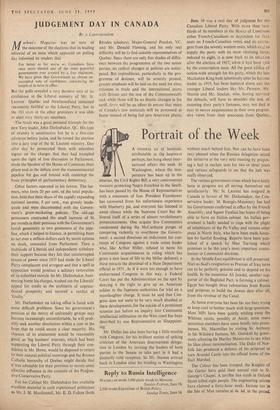JUDGEMENT DAY IN CANADA
By a Correspmulent
Maelean's Magazine was so ' sure of the outcome of the elections that its leading editorial of an issue which appeared on polling day informed its readers that
For better or for worse we Canadians have once more elected one of the most pgwerful governments ever created by. a free electorate. We have given that Government an almost un- exampled vote of confidence, considering the length of its term in office.
But the polls revealed a very decisive vote of no confidence in the Liberal ministry of Mr. St. Laurent Quebec and Newfoundland remained reasonably faithful to the Liberal Party, but in the 183 seats in the other provinces it was able to elect only thirty-six members.
The result was a great personal triumph for the new Tory leader, John Diefenbaker, QC. His type of oratory is unattractive but he is a first-rate advocate before juries, and he turned the election into a jury trial of the St. Laurent ministry. Day after day he prosecuted them with relentless vigour on the charges that they had trampled upon the right of free discussion in Parliament, made the Speaker of the House of Commons their pliant tool in the debate over the transcontinental pipeline for gas and treated with contempt the basic principles of parliamentary democracy.
Other factors operated in his favour. The far- mers, who form 20 per cent. of the total popula- tion, held that their share of the rapidly expanding national income, 8 per cent., was grossly inade- quate and were discontented with the Govern- ment's grain-marketing policies. The old-age pensioners contrasted the small increase of $6 per month in their pensions with the Government's lavish generosity to two promoters of the pipe- line, which it helped to finance, in permitting them to net over a million dollars each by secret options on stock, concealed from Parliament. Then a multitude of Liberals and independents withdrew their support because they felt that uninterrupted tenure of power since 1935 had made the Liberal Party complacent and arrogant and that a spell in opposition would produce a salutary restoration of its enfeebled morale. So Mr. Diefenbaker, ham- mering home his charges, washed out the Liberals' appeal for credit as the architects of unprece- dented prosperity and secured a verdict of 'Guilty.'
Mr. Diefenbaker on taking office is faced with some difficult problems. Since his government's position at the mercy of unfriendly groups may become increasingly uncomfortable, he will prob- ably seek another dissolution within a year in the hope that he could secure a clear majority. His chances of its attainment would be reasonably good, as 'big business' interests, which had been supporting the Liberal Party through their con- fidence in Mr. Howe, would be disposed to return to their natural political moorings and the Roman Catholic hierarchy of Quebec might decide that it was advisable for their province to secure some effective influence in the councils of the Progres- sive-Conservative Party.
For his Cabinet Mr. Diefenbaker has available excellent material in such experienced politicians as Mr. J. M. Macdonnell, Mr. E. D. Fulton (both Rhodes scholars), Major-General Pearkes, VC, and Mr. Donald Fleming, and his only real difficulty will be to find suitable representatives of Quebec. Since there are only fine shades of differ- ence between the programmes of the two senior parties, no radical changes in policies are antici- pated, But expenditures, particularly in the pro- gramme of defence, will be severely pruned, greater emphasis will be laid on the need for close relations in trade and the international arena with Britain and the rest of the Commonwealth and, while there will be no drastic changes in the tariff, there will be an effort to ensure that more of Canada's raw materials will be processed at home instead of being fed into American plants. June 10 was a real day of judgment for the Canadian Liberal Party. With mare than two- thirds of its members in the House of Commons either French-Canadians or dependent for tier seats on French-Canadian votes, and its cOntin- gent from the seventy western seats, which vs.::: to supply the party with its most vitalising force, reduced to eight, it is now back to its situat:on after the election of 1917, when it had been p!it by the conscription issue. All the great edifice of nation-wide strength for his party, which the late Mackenzie King built laboriously after he bec:Ime leader in 1919, has been battered down and the younger Liberal leaders like Mr. Pearson, Mr. Martin and Mr. Sinclair, who, having survived the debacle, will have to shoulder the task of restoring their party's fortunes, may not find it easy to secure acquiescence in their own progres- sive views from their associates from Quebec.


































 Previous page
Previous page